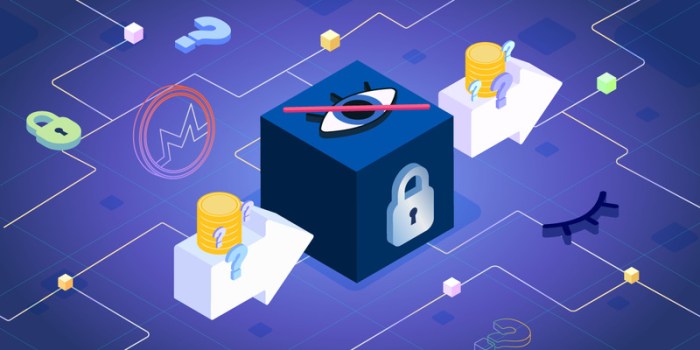Privacy coins, the unsung heroes of the cryptocurrency realm, offer a cloak of anonymity in a digital world full of prying eyes and data breaches. Dive into the realm of privacy coins and discover how they revolutionize financial transactions with their discreet features.
What are Privacy Coins?

Privacy coins are a type of cryptocurrency that prioritize the anonymity and privacy of transactions made on their networks. Unlike traditional cryptocurrencies like Bitcoin, where transactions are transparent and can be traced on a public ledger, privacy coins aim to provide users with a higher level of privacy and security.
These coins use various technologies such as ring signatures, stealth addresses, and zero-knowledge proofs to obfuscate transaction details and ensure that the identities of the sender and receiver are kept private. This added layer of privacy is appealing to users who value confidentiality and want to protect their financial information from prying eyes.
Key Features of Privacy Coins
- Enhanced privacy and anonymity in transactions
- Decentralized nature, similar to other cryptocurrencies
- Use of advanced cryptographic techniques to secure transactions
- Protection against surveillance and tracking
Importance of Privacy in Cryptocurrency
Privacy is crucial in the realm of cryptocurrency as it ensures the security and confidentiality of financial transactions. Without privacy features, users risk exposing sensitive information and potentially becoming targets for hacking or fraud. Privacy coins offer a solution to these concerns by prioritizing anonymity and protecting user data.
Comparison to Other Cryptocurrencies
- Privacy coins focus on anonymity, while other cryptocurrencies prioritize transparency.
- Bitcoin, Ethereum, and other mainstream coins have public ledgers, while privacy coins have private transaction details.
- Privacy coins provide a higher level of security and confidentiality compared to traditional cryptocurrencies.
Popular Privacy Coins in the Market
- Monero (XMR): Known for its strong privacy features and untraceable transactions.
- Zcash (ZEC): Utilizes zero-knowledge proofs to ensure privacy and selective transparency.
- Dash (DASH): Offers optional privacy features through PrivateSend transactions.
How Privacy Coins Ensure Anonymity?
Privacy coins ensure anonymity through advanced cryptographic techniques and innovative protocols that shield user identities from being traced or linked to transactions. By leveraging technologies like ring signatures, stealth addresses, and zero-knowledge proofs, privacy coins offer a high level of confidentiality and privacy protection for users.
Role of Cryptographic Techniques
Cryptographic techniques play a crucial role in maintaining anonymity within privacy coins. For instance, ring signatures enable a group of users to sign a transaction without revealing which user actually initiated it. This ensures that the true sender remains hidden among the decoy signatures, enhancing privacy and confidentiality. Additionally, stealth addresses generate unique one-time addresses for each transaction, making it challenging to link transactions to specific users.
Comparison of Privacy Coin Protocols
Different privacy coin protocols, such as Monero, Zcash, and Dash, offer varying approaches to anonymity. Monero, for example, employs ring signatures, stealth addresses, and confidential transactions to obfuscate sender and receiver information. Zcash utilizes zk-SNARKs to enable selective transparency, allowing users to disclose transaction details if desired. Dash implements a mixing mechanism called PrivateSend to anonymize transactions by combining them with others.
Real-World Examples
Privacy coins have been instrumental in protecting user identities in various scenarios. For instance, individuals in countries with strict financial surveillance have utilized privacy coins to conduct transactions without exposing their identities. Businesses seeking to safeguard sensitive financial information have also turned to privacy coins for secure and confidential transactions. Overall, privacy coins have demonstrated their effectiveness in preserving anonymity and privacy in an increasingly surveilled digital landscape.
Use Cases of Privacy Coins
Privacy coins have a wide range of practical applications in various industries and scenarios. These digital currencies offer enhanced privacy and security features, making them particularly useful in transactions where anonymity is crucial.
Confidential Transactions, Privacy coins
- Privacy coins are ideal for confidential transactions where individuals or businesses want to protect sensitive financial information.
- By using advanced cryptographic techniques, privacy coins ensure that transaction details are hidden from prying eyes, providing a secure way to transfer funds.
- Examples of confidential transactions include salary payments, donations to sensitive causes, or business transactions that require discretion.
Dark Web Purchases
- Privacy coins are commonly used for making purchases on the dark web, where users can buy goods and services anonymously.
- Due to the untraceable nature of privacy coins, individuals can conduct transactions without revealing their identity or personal information.
- These coins provide a layer of protection for users engaging in activities that require anonymity, such as purchasing restricted items or accessing certain services online.
Censorship Resistance
- Privacy coins offer censorship resistance, allowing individuals to bypass restrictions imposed by governments or financial institutions.
- Users can send and receive funds without fear of censorship, ensuring financial freedom and privacy in regions with strict regulations.
- Privacy coins empower individuals to transact freely and securely, regardless of external interference or surveillance.
Privacy Concerns and Regulatory Challenges

Privacy concerns and regulatory challenges surrounding privacy coins have become a hot topic in the financial world. While privacy coins offer anonymity and security to users, they also pose a threat in terms of illegal activities and money laundering.
Privacy Concerns
- Privacy coins can be used for illicit activities such as drug trafficking, terrorism financing, and tax evasion due to the difficulty in tracking transactions.
- Users may misuse the privacy features of these coins to engage in criminal behavior without fear of being identified.
- Privacy coins can also attract hackers and cybercriminals looking to exploit the anonymity provided by these cryptocurrencies.
Regulatory Challenges
- Regulators face difficulties in monitoring and regulating transactions involving privacy coins, as the anonymity they provide makes it challenging to trace the flow of funds.
- Government agencies struggle to enforce anti-money laundering (AML) and know-your-customer (KYC) regulations when dealing with privacy coins.
- Regulators worry about the potential impact of privacy coins on traditional financial systems and the ability to maintain financial stability.
Impact on Financial Systems and Governments
- Privacy coins could disrupt the current financial landscape by offering an alternative system that bypasses traditional banking institutions.
- Governments may face challenges in collecting taxes and preventing tax evasion if users shift to using privacy coins for transactions.
- The rise of privacy coins could lead to increased scrutiny from regulatory bodies and potentially stricter regulations on the use of cryptocurrencies.
Examples of Regulatory Actions
- In 2020, the Financial Action Task Force (FATF) updated its guidance to include regulations specific to virtual assets and virtual asset service providers, including those dealing with privacy coins.
- The U.S. Department of the Treasury’s Financial Crimes Enforcement Network (FinCEN) has proposed regulations requiring exchanges to collect more information on transactions involving privacy coins to combat money laundering.
- Several countries, including Japan and South Korea, have introduced laws to regulate the use of privacy coins and enhance transparency in cryptocurrency transactions.